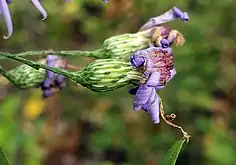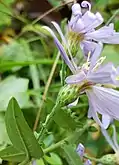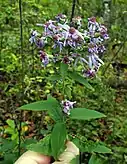Symphyotrichum shortii
Symphyotrichum shortii (formerly Aster shortii), commonly called Short's aster,[3] is a species of flowering plant in the family Asteraceae. It is native to North America, where it is primarily found in interior areas east of the Mississippi River.[4] Its natural habitat is in thin rocky soils of woodlands and thickets often around limestone bluffs.[5][4] It is common throughout much of its range, although it is generally restricted to intact natural communities.[5]
| Symphyotrichum shortii | |
|---|---|
.jpg.webp) | |
| Scientific classification | |
| Kingdom: | Plantae |
| Clade: | Tracheophytes |
| Clade: | Angiosperms |
| Clade: | Eudicots |
| Clade: | Asterids |
| Order: | Asterales |
| Family: | Asteraceae |
| Tribe: | Astereae |
| Subtribe: | Symphyotrichinae |
| Genus: | Symphyotrichum |
| Subgenus: | Symphyotrichum subg. Symphyotrichum |
| Section: | Symphyotrichum sect. Symphyotrichum |
| Species: | S. shortii |
| Binomial name | |
| Symphyotrichum shortii | |
 | |
| Native distribution[2] | |
| Synonyms[2] | |
|
Basionym
Alphabetical list
| |
Description
Symphyotrichum shortii is a perennial herbaceous plant growing up to 110 centimeters (3.5 feet). It produces flower heads with purple ray florets in late summer and fall. Unlike many related Symphyotrichum species, its stem leaves are essentially entire and do not have a winged petiole. It bears a resemblance to the related Symphyotrichum oolentangiense of farther west, from which S. shortii can be distinguished by its cordate stem leaves and pubescent phyllaries.[6]
Chromosomes
S. shortii has a base number of eight chromosomes (x = 8). Diploid and tetraploid plants with respective chromosome counts of 16 and 32 have been reported.[7]
Taxonomy
The species was first formally described and named Aster shortii by English botanist John Lindley in 1834.[8] A natural hybrid of S. cordifolium and S. shortii can occur, and this has been named Symphyotrichum × finkii.[7]
Distribution and habitat
Symphyotrichum shortii is native to North America, where it is primarily found in interior areas east of the Mississippi River.[4] Its natural habitat is in thin rocky soils of woodlands and thickets often around limestone bluffs.[5][4] It is common throughout much of its range, although it is generally restricted to intact natural communities.[5]
Citations
References
- Brouillet, L.; Semple, J.C.; Allen, G.A.; Chambers, K.L.; Sundberg, S.D. (2006a). "Symphyotrichum cordifolium". In Flora of North America Editorial Committee (ed.). Flora of North America North of Mexico (FNA). Vol. 20. New York and Oxford: Oxford University Press. Retrieved 23 July 2021 – via eFloras.org, Missouri Botanical Garden, St. Louis, MO & Harvard University Herbaria, Cambridge, MA.
- Brouillet, L.; Semple, J.C.; Allen, G.A.; Chambers, K.L.; Sundberg, S.D. (2006b). "Symphyotrichum shortii". In Flora of North America Editorial Committee (ed.). Flora of North America North of Mexico (FNA). Vol. 20. New York and Oxford: Oxford University Press. Retrieved 23 July 2021 – via eFloras.org, Missouri Botanical Garden, St. Louis, MO & Harvard University Herbaria, Cambridge, MA.
- Hilty, J. (2016). "Short's Aster (Symphyotrichum shortii)". Illinois Wildflowers (www.illinoiswildflowers.info). Retrieved 23 July 2021.
- "Aster shortii Lindl. ex Hook". International Plant Names Index (IPNI). Royal Botanic Gardens, Kew; Harvard University Herbaria & Libraries; Australian National Botanic Gardens. Retrieved 23 July 2021.
- NatureServe (2 July 2021). "Symphyotrichum shortii Short's Aster". explorer.natureserve.org. Arlington, Virginia. Retrieved 7 July 2021.
- POWO (2019). "Symphyotrichum shortii (Lindl.) G.L.Nesom". Plants of the World Online. Royal Botanic Gardens, Kew. Retrieved 7 July 2021.
- USDA, NRCS (2014). "Symphyotrichum shortii". The PLANTS Database (plants.usda.gov). Greensboro, North Carolina: National Plant Data Team. Retrieved 3 July 2018.
- Weakley, A. (20 October 2020). Flora of the Southeastern United States. p. 1582. Retrieved 7 July 2021.
{{cite book}}:|website=ignored (help)





